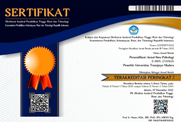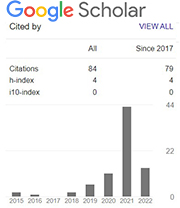Parenting Style dan Kesejahteraan Psikologis pada Remaja Penyandang Disabilitas Fisik
Abstract
Keywords
Full Text:
PDF (Bahasa Indonesia)References
Agoha, B. C., Adewole, I., Adekeye, O., & Ayotunde, E. (2021). Parenting style and psychological well-being of secondary school children. International Journal of Research and Innovation in Social Science, 5(11), 41-44. https://www.rsisinternational.org/journals/ijriss/Digital-Library/volume-5-issue-11/41-44.pdf
Akinnawo, E. O., Akpunne, B. C., & Olajide, O. A. (2020). Perceived parenting styles and psycho-social wellbeing of Nigerian adolescents. International Journal of Scientific Research and Management, 8(2), 628-637. https://doi.org/10.18535/ijsrm/v8i02.sh02
Badan Pusat Statistik. (2022). Disabilitas. Diakses dari https://sensus.bps.go.id/topik/dataset/sp2022/19
Barton, A. L., & Hirsch, J. K. (2015). Permissive parenting and mental health in college students: Mediating effects of academic entitlement. Journal of American College Health, 64(1), 1-8. https://doi.org/10.1080/07448481.2015.1060597
Baumrind, D. (1991). The influence of parenting style on adolescent competence and substance use. The Journal of Early Adolescence, 11(1), 56-95. https://doi.org/10.1177/0272431691111004
Becht, A. I., Nelemans, S. A., Branje, S. J. T., Vollebergh, W. A. M., Koot, H. M., & Meeus, W. H. J. (2017). Identity uncertainty and commitment making across adolescence: Five-year within-person associations using daily identity reports. Developmental Psychology, 53(11), 2103-2112. https://doi.org/10.1037/dev0000374
Canha, L., Simões, C., Matos, M. G., & Owens, L. (2016). Well-being and health in adolescents with disabilities. Psicologia: Reflexao e Critica, 29(1). https://doi.org/10.1186/s41155-016-0041-9
Crandell, J. L., Sandelowski, M., Leeman, J., Havill, N. L., & Knafl, K. (2018). Parenting behaviors and the well-being of children with a chronic physical condition. Families, Systems, & Health, 36(1), 45. https://doi.org/10.1037/fsh0000305
Crone, E. A., & Fuligni, A. J. (2020). Self and others in adolescence. Annual Review of Psychology, 71, 447-469. https://doi.org/10.1146/annurev-psych-010419-050937
Darling, N., & Steinberg, L. (2017). Parenting style as context: An integrative model. In Interpersonal Development (pp. 161-170). Routledge. https://doi.org/10.4324/9781351153683-8
Dewi, N. K. Y., Kusumaningtiyas, D. P. H., & Priastana, I. K. A. (2022). Gambaran Pola asuh orang tua remaja retardasi mental di SLBC Kemala Bhayangkari Tabanan. Indonesian Journal of Global Health Research, 5(1), 11-18. https://doi.org/10.51713/idjhr.v5i1.46
Downs, J., Blackmore, A. M., Epstein, A., Skoss, R., Langdon, K., Jacoby, P., … Glasson, E. J. (2017). The prevalence of mental health disorders and symptoms in children and adolescents with cerebral palsy: A systematic review and meta-analysis. Developmental Medicine and Child Neurology, 60(1), 30-38. https://doi.org/10.1111/dmcn.13555
Fahiroh, S. A., Tairas, M. M. W., & Retnowati, S. (2019). Validation of parenting styles and dimensions questionnaire (PSDQ) on adolescents. Journal of Educational, Health and Community Psychology, 8(2), 157. https://doi.org/10.12928/jehcp.v8i2.12958
Fatmawaty, R. (2017). Memahami psikologi remaja. Jurnal Reforma, 6(2), 55-65. https://doi.org/10.30736/rfma.v6i2.33
Francis, A., Pai, M. S., & Badagabettu, S. (2020). Psychological well-being and perceived parenting style among adolescents. Comprehensive Child and Adolescent Nursing, 44(2), 134-143. https://doi.org/10.1080/24694193.2020.1743796
Gul, N., Khan, H., & Niwaz, A. (2021). Parenting styles out comes on psychological well-being of children. Rawal Medical Journal, 46(3), 652-655. https://www.researchgate.net/profile/Nighat-Gul-2/publication/354066247_Parenting_styles_out_comes_on_psychological_well-being_of_children/links/61232c72232f955865a3d0fd/Parenting-styles-out-comes-on-psychological-well-being-of-children.pdf
Huwae, A., & Novita, M. P. (2022). Regulasi diri, peer support, dan burnout pada mahasiswa difabel. Psychocentrum Review, 4(1), 44-54. https://doi.org/10.26539/pcr.41792
Karimah, A. S., & Nrh, F. (2016). Perbedaan psychological well-being remaja ditinjau dari persepsi pola asuh orang tua. Jurnal EMPATI, 5(2), 291-295. Retrieved from https://ejournal3.undip.ac.id/index.php/empati/article/view/15219
Khan, Y., Taghdisi, M. H., & Nourijelyani, K. (2015). Psychological well-being (PWB) of School adolescents aged 12- 18 yr, its correlation with general levels of physical activity (PA) and socio-demographic factors in Gilgit, Pakistan. Iran J Public Health, 44(6), 804-813. Retrieved from https://www.ncbi.nlm.nih.gov/pmc/articles/PMC4524305/
Khodabakhsh, M. R., Kiani, F., & Ahmedbookani, S. (2014). Psychological well-being and parenting styles as predictors of mental health among students: Implication for health promotion. International Journal of Pediatrics, 2(3), 39-46. https://doi.org/10.22038/ijp.2014.3003
Lavasani, M. G., Borhanzadeh, S., Afzali, L., & Hejazi, E. (2011). The relationship between perceived parenting styles, social support with psychological well-being. Procedia-Social and Behavioral Sciences, 15, 1852-1856. https://doi.org/10.1016/j.sbspro.2011.04.014
Lestari, T. R., Adyas, A., Rachmawati, E., Ardesa, Y. H., & Pasaribu, E. S. (2018). Kekuatan dan kesulitan remaja disabilitas di Yayasan Pendidikan Anak Cacat (YPAC) Jakarta dan Surakarta. Jurnal Kesehatan, 9(2), 248-252. https://doi.org/10.26630/jk.v9i2.898
Lestari, Y. I., & Yumra, M. A. (2022). Pola asuh otoritatif dan psychological well-being pada remaja. Psikobuletin:Buletin Ilmiah Psikologi, 3(2), 80. https://doi.org/10.24014/pib.v3i2.16914
Maxey, M., & Beckert, T. E. (2016). Adolescents with disabilities. Adolescent Research Review, 2(2), 59-75. https://doi.org/10.1007/s40894-016-0043-y
Nasrollahzade, S., Mahmoudfakhe, H., & Rahmani, A. (2015). Comparison of parenting styles and mental health among students. International Letters of Social and Humanistic Sciences, 62, 147-156. https://doi.org/10.18052/www.scipress.com/ILSHS.62.147
Ningsih, F., & Susanti, S. S. (2019). Psychological well-being pada penyandang disabilitas fisik physicological well-being of physical disability people. Jurnal Imiah Mahasiswa Fakultas Keperawatan Universitas Syah Kuala, 4(1), 87-94. Retrieved from http://jim.unsyiah.ac.id/FKep/issue/view/449
Ohlert, J., & Ott, I. (2017). Developmental tasks and well-being in adolescent elite athletes in comparison with recreational/non-athletes. European Journal of Sport Science, 17(10), 1343-1349. https://doi.org/10.1080/17461391.2017.1365935
Peng, B., Hu, N., Yu, H., Xiao, H., & Luo, J. (2021). Parenting style and adolescent mental health: The chain mediating effects of self-esteem and psychological inflexibility. Frontiers in Psychology, 12, 738170. https://doi.org/10.3389/fpsyg.2021.738170
Purnama, N. L. A. (2022). Relationship of parenting paterrns with the self confidence of pre school children in the pandemic COVID 19. Cientific Journal of Nursing, 8(2), 486-494. https://doi.org/10.33023/jikep.v8i2.1074
Putri, P. N. A., & Rustika, I. M. (2017). Peran pola asuh autoritatif, efikasi diri, dan perilaku prososial terhadap kesejahteraan psikologis pada remaja akhir di program studi pendidikan dokter gigi Fakultas Kedokteran Universitas Udayana. Jurnal Psikologi Udayana, 4(1), 151-164. https://doi.org/10.24843/JPU.2017.v04.i01.p16
Raboteg-Saric, Z., & Sakic, M. (2014). Relations of parenting styles and friendship quality to self-esteem, life satisfaction and happiness in adolescents. Applied Research in Quality of life, 9, 749-765. https://doi.org/10.1007/s11482-013-9268-0
Radissa, V. S., Wibowo, H., Humaedi, S., & Irfan, M. (2020). Pemenuhan kebutuhan dasar penyandang disabilitas pada masa pandemi Covid-19. Focus: Jurnal Pekerjaan Sosial, 3(1), 61. https://doi.org/10.24198/focus.v3i1.28735
Rahmania, R., Munir, A., & Budiman, Z. (2019). Hubungan lokus kendali internal dan dukungan sosial dengan kesejahteraan psikologis pada penyandang disabilitas di Aceh Tengah. Tabularasa: Jurnal Ilmiah Magister Psikologi, 1(1), 49-58. https://doi.org/10.31289/tabularasa.v1i1.275
Ryff, C. D. (2013). Psychological well-being revisited: Advances in the science and practice of eudaimonia. Psychotherapy and Psychosomatics, 83(1), 10-28. https://doi.org/10.1159/000353263
Santrock, J. W. (2014). Adolescence (15th ed.). New York: McGraw-Hill Education.
Savitri, W. C., & Listiyandini, R. A. (2017). Mindfulness dan kesejahteraan psikologis pada remaja. Psikohumaniora: Jurnal Penelitian Psikologi, 2(1), 43-59. https://doi.org/10.21580/pjpp.v2i1.1323
Shahimi, F., Heaven, P., & Ciarrochi, J. (2013). The interrelations among the perception of parental styles and psychological well-being in adolescence: A longitudinal study. Iranian Journal of Public Health, 42(6), 570-580. Retrieved from https://www.ncbi.nlm.nih.gov/pmc/articles/PMC3744253/pdf/ijph-42-570.pdf
Smetana, J. G. (2017). Current research on parenting styles, dimensions, and beliefs. Current Opinion in Psychology, 15, 19-25. https://doi.org/10.1016/j.copsyc.2017.02.012
Steptoe, A., & Di Gessa, G. (2021). Mental health and social interactions of older people with physical disabilities in England during the COVID-19 pandemic: A longitudinal cohort study. The Lancet Public Health, 6(6), e365-e373. https://doi.org/10.1016/S2468-2667(21)00069-4
Suyanto, Amal, A. I., Noor, A., & Astutik, I. T. (2018). Analisis data penelitian petunjuk praktis bagi mahasiswa kesehatan menggunakan SPSS. Semarang: UNISSULA PRESS.
Uji, M., Sakamoto, A., Adachi, K., & Kitamura, T. (2014). The impact of authoritative, authoritarian, and permissive parenting styles on children's later mental health in Japan: Focusing on parent and child gender. Journal of Child and Family Studies, 23(2), 293-302. https://doi.org/10.1007/s10826-013-9740-3
Wahyuningsih, H., Kusumaningrum, F. A., & Novitasari, R. (2020). Parental marital quality and adolescent psychological well-being: A meta-analysis. Cogent Psychology, 7(1), 1-14. https://doi.org/10.1080/23311908.2020.1819005
Weiss, L. A., Westerhof, G. J., & Bohlmeijer, E. T. (2016). Can we increase psychological well-being? The effects of interventions on psychological well-being: A meta-analysis of randomized controlled trials. PLoS ONE, 11(6), 1-16. https://doi.org/10.1371/journal.pone.0158092
wischerth, g. a., mulvaney, m. k., brackett, m. a., & perkins, d. (2016). the adverse influence of permissive parenting on personal growth and the mediating role of emotional intelligence. Journal of Genetic Psychology, 177(5), 185-189. https://doi.org/10.1080/00221325.2016.1224223
Yadav, P., Shukla, P., Padhi, D., & Chaudhury, S. (2021). A correlational study between perceived parenting style, psychological well-being, and emotional intelligence among adolescents. Industrial Psychiatry Journal, 30(3), 108-114. https://doi.org/10.4103/0972-6748.328798
DOI: https://doi.org/10.21107/personifikasi.v15i2.22137
Refbacks
- There are currently no refbacks.
Copyright (c) 2024 Felicia Christofani Nathan, Arthur Huwae

This work is licensed under a Creative Commons Attribution 4.0 International License.


Personifikasi by Universitas Trunojoyo Madura is licensed under a Creative Commons Attribution 4.0 International License.










